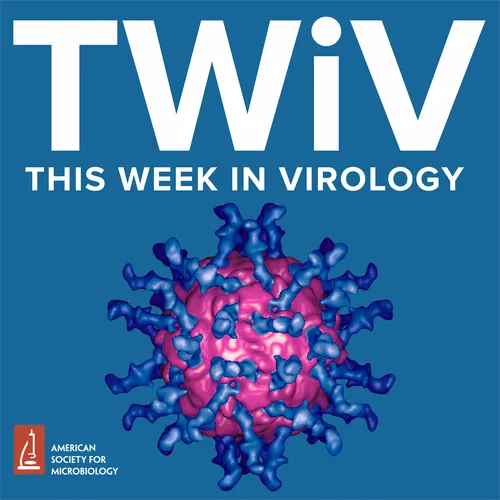
This Week in Virology
TWiV is a weekly netcast about viruses - the kind that make you sick. Brought to you by four university professors and a science writer.
- Update frequency
- every 3 days
- Average duration
- 86 minutes
- Episodes
- 1282
- Years Active
- 2008 - 2025

TWiV 862: COVID-19 clinical update #100 with Dr. Daniel Griffin
In COVID-19 clinical update #100, Daniel Griffin, from Accra, Ghana, reviews the challenges in evaluating Omicron severity, over 800 deaths in children, Pfizer vaccine EUA application for under 5 yea…

TWiV 861: Rough draft of Omicron origins
Nels joins TWiV to discuss hypotheses for the origins of Omicron, including that it came from mice or arose during chronic infection of an immunocompromised patient.
Hosts: Vincent Racaniello, Rich C…

TWiV 860: Evading a Toll on the road to RNA vaccines
TWiV reviews a seminal paper showing that chemically modified bases in RNAs suppress recognition by Toll-like receptors, a finding that that was essential for the development of COVID-19 mRNA vaccine…

TWiV 859: COVID-19 clinical update #99 with Dr. Daniel Griffin
In COVID-19 clinical update #99, Daniel Griffin discusses Omicron disease severity, neurologic manifestations in children, testing outcomes during multiple infections, boosters improve VE and VD, boo…

TWiV 858: The vax of life with John Mascola
John Mascola joins TWiV to discuss the history and mission of the NIH Vaccine Research Center, how it prepared for devising pandemic vaccines, and development of the COVID-19 vaccines.
Hosts: Vincent…

TWiV 857: Not just antibody, Jon Yewdell
Jon Yewdell returns to TWiV to discuss how antibodies are made, vaccination against SARS-CoV-2, antigenic variation of the virus, booster shots, and more.
Hosts: Vincent Racaniello, Dickson Despommie…

TWiV 856: COVID-19 clinical update #98 with Dr. Daniel Griffin
In COVID-19 clinical update #98, Daniel Griffin reviews COVID-19 in South Africa, recognition of Omicron by ancestral T cells, booster effectiveness against disease, infection and vaccination in preg…

TWiV 855: T time with Alessandro Sette
Alessandro Sette returns to TWiV to discuss the observation that SARS-CoV-2 vaccination induces T cells that are able to cross-recognize variants Alpha to Omicron.
Hosts: Vincent Racaniello, Rich Con…

TWiV 854: Omicron is evasive
TWiV reviews findings that increased fitness of the Omicron variant is due to immune evasion, not an increase in intrinsic transmissibility, and determination of infectious viral load in patients inf…

TWiV 853: COVID-19 clinical update #97 with Dr. Daniel Griffin
In COVID-19 clinical update #97, Daniel Griffin covers immunity after infection recognized by CDC, outcomes before and after Omicron, infectious viral load in Delta vs Omicron, PCR vs rapid antigen t…

TWiV 852: Tree man syndrome
A TWiV threesome explains the observation that humans with inherited T cell CD28 deficiency are susceptible to severe warts driven by human papilloma virus infection, but are otherwise healthy.
Hosts…

TWiV 851: Questions are tricky
The TWiV team reviews the observation that infection with the SARS-CoV-2 Omicron variant causes reduced reproduction and pathogenesis in mice and hamsters.
Hosts: Vincent Racaniello, Dickson Despommi…

TWiV 850: COVID-19 clinical update #96 with Dr. Daniel Griffin
In COVID-19 clinical update #96, Daniel Griffin reviews Omicron in South Africa, rapid antigen tests, viral coinfections, isolation and quarantine, saliva preferred for Omicron, risk factors for seve…

TWiV 849: Arc of the epitope
TWiV kicks off 2022 with a review of the virology highlights of 2021, from three virologists, one immunologist, a science writer, and a partridge in a pear tree.
Hosts: Vincent Racaniello, Alan Dove,…

TWiV 847: On Dasher, on Dancer, on Corona and Lassa
For the final episode of 2021, TWiV reviews an experimental infectious attenuated Lassa fever vaccine based on a codon-deoptimized glycoprotein gene, and SARS-CoV-2 infection of free-ranging white-ta…

TWiV 848: COVID-19 clinical update #95 with Dr. Daniel Griffin
In COVID-19 clinical update #95, Daniel Griffin discusses new CDC guidelines for isolation and quarantine, EUA for Molnupiravir, children and COVID, vaccine safety in 5-11 year olds, Omicron outbreak…

TWiV 846: Beta was stirring, and now in a mouse
TWiV explores the impact of the intestinal virome on seroconversion after rotavirus vaccination, and implications of the ability of the SARS-CoV-2 beta variant to infect wild-type laboratory mice.
Ho…

TWiV 845: COVID-19 clinical update #94 with Dr. Daniel Griffin
In COVID-19 clinical update #94, Daniel Griffin reviews the FDA EUA for Paxlovid, test to stay in school, immunity after infection, variants and therapeutics, quarantine and isolation guidelines, Mol…

TWiV 844: Paul Offit on children, COVID, and boosters
Paul Offit returns to TWiV to discuss new CDC guidance on J&J vaccine, why children should be immunized against COVID-19, and whether or not booster doses are scientifically justified.
Hosts: Vincent…

TWiV 843: COVID-19 clinical update #93 with Dr. Daniel Griffin
In COVID-19 clinical update #93, Dr. Griffin summarizes Omicron fitness, S-gene target failure, monoclonal efficacy against Omicron, vaccination, monoclonals, and disease in children, persistence of …